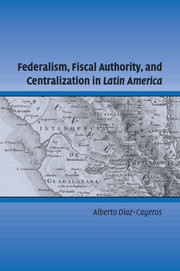Book contents
- Frontmatter
- Contents
- List of Figures
- List of Tables
- Preface
- Federalism, Fiscal Authority, and Centralization in Latin America
- 1 FEDERALISM, PARTY HEGEMONY, AND THE CENTRALIZATION OF FISCAL AUTHORITY
- Part I Fiscal Centralization in Mexico
- 2 REGIONAL FRAGMENTATION AND FAILED COMMITMENT
- 3 THE OFFICIAL PARTY AS A REGIONAL COMPROMISE
- 4 NOMINATIONS, VETO PLAYERS, AND GUBERNATORIAL STABILITY
- 5 TRANSFERS AND REDISTRIBUTION IN THE MEXICAN STATES
- Part II Centralization and Revenue-Sharing in the Latin American Federations
- References
- Index
- Titles in the Series
3 - THE OFFICIAL PARTY AS A REGIONAL COMPROMISE
Published online by Cambridge University Press: 08 January 2010
- Frontmatter
- Contents
- List of Figures
- List of Tables
- Preface
- Federalism, Fiscal Authority, and Centralization in Latin America
- 1 FEDERALISM, PARTY HEGEMONY, AND THE CENTRALIZATION OF FISCAL AUTHORITY
- Part I Fiscal Centralization in Mexico
- 2 REGIONAL FRAGMENTATION AND FAILED COMMITMENT
- 3 THE OFFICIAL PARTY AS A REGIONAL COMPROMISE
- 4 NOMINATIONS, VETO PLAYERS, AND GUBERNATORIAL STABILITY
- 5 TRANSFERS AND REDISTRIBUTION IN THE MEXICAN STATES
- Part II Centralization and Revenue-Sharing in the Latin American Federations
- References
- Index
- Titles in the Series
Summary
Party Politics and Regional Fragmentation
The previous chapter has shown that the debates surrounding the efforts toward centralization of the tax system during the 1920s and 1930s reflected underlying political differences between national and regional leaders. A fragmented fiscal system remained the status quo, imposing economic losses on both the state and federal governments. The origins of this economic failure were political. A successful resolution came only in subsequent decades as Mexican politicians crafted an institutional innovation, namely a hegemonic corporatist political party, that provided means to solve the problems that had bedeviled the fiscal regime. The party brought about political stability and limited taxation through fiscal integration, but ultimately at the cost of undermining democracy and federalism. In terms of the logic spelled out by the theoretical account in Chapter 1, the party created a commitment mechanism that made transfers credible.
During the early postrevolutionary years, thousands of regional political “parties,” mere personal organizations centered around revolutionary leaders, competed for local and national offices. Local elections were characterized by postelectoral conflict in which contenders declared victory regardless of the vote count, resorting to arms in order to settle their disputes. The lack of national political integration was reflected in the federal legislature, which, providing veto power to regional politicians, often proved ineffective in national policymaking.
The establishment of the PRI's predecessor, the Partido Nacional Revolucionario (PNR), in 1929 represented an explicit attempt to address the problems of regional fragmentation.
- Type
- Chapter
- Information
- Publisher: Cambridge University PressPrint publication year: 2006

